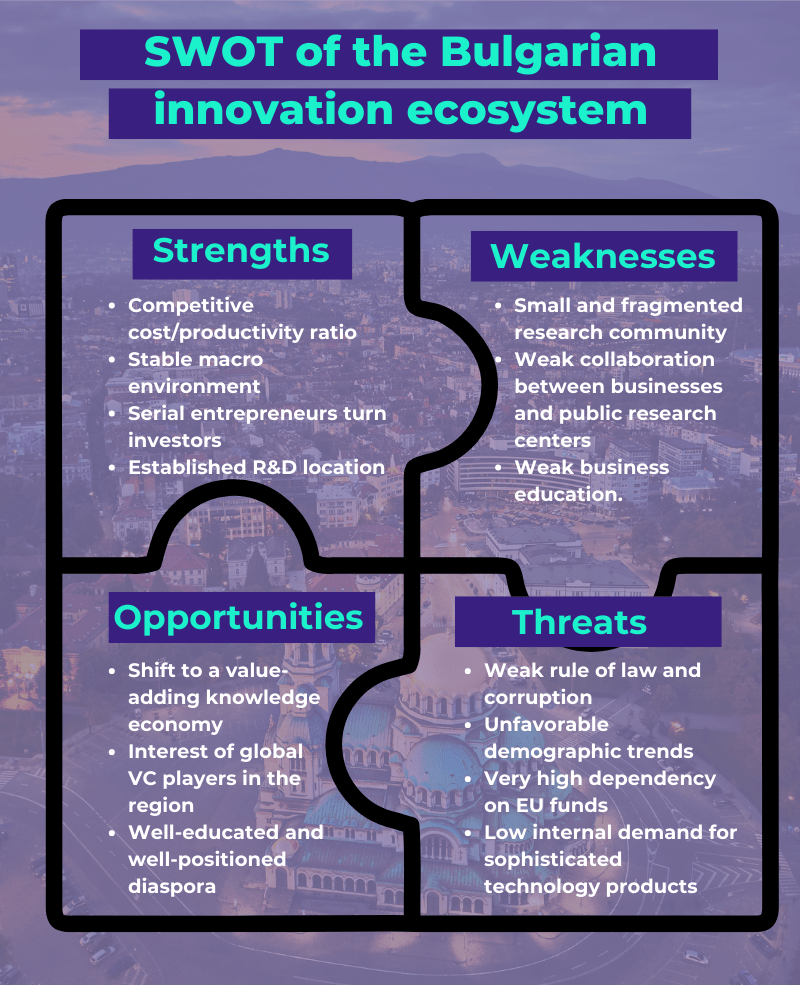Every innovation ecosystem goes through a different trajectory and has different strengths and weaknesses. However, it is still effective to study the lessons of successful global innovation regions. By identifying how innovation processes are accelerated or hindered by regional characteristics, we can understand what are the right ingredients for policy development and ecosystem resource planning.
Today INCREDA.org, The Recursive, and FEBA Sofia University “St. Kliment Ohridski” hosted a webinar on the topic of innovation in Bulgaria. We welcomed Sacha Wunsch-Vincent, co-author of the prestigious Global Innovation Index reports of the World Intellectual Property Organization – WIPO, who presented for the first time to the Bulgarian public the Index and Bulgaria’s innovation performance.
The event featured the Deputy Minister of Innovation and Growth, Karina Angelieva, who committed to providing a collaborative environment, prioritizing high-impact policies and instruments, and setting up robust monitoring, based on data.
Key stakeholders of the Bulgarian innovation ecosystem engaged in an online discussion to showcase the capacity for innovation in the industry, corporate R&D, state agencies, and academic institutions. Guests speakers were Boni Bonev, Member, Board of Directors at Nestle Bulgaria, Ivan Rusev, Head of Software Development at Experian, Sylvia Ilieva, Director at GATE Institute, Martin Danovsky, Chairman of State Agency for Research and Innovation, Ilia Krastev, Chairman of AIBEST, Martin Gikov, CEO and Chairman of the Management Board at Fund of Funds in Bulgaria, and Todor Yalamov, Professor at Sofia University. Hosts were Veneta Andonova, Dean and Associate Professor at Universidad de Los Andes, and Mira Krusteff, Director and Board Member at INCREDA.org
Bulgaria scores second among upper-middle-income countries and 35th globally on the Global Innovation Index 2021. The next GII index report will launch at the end of September 2022 when INCREDA.org will present the results.
How do you measure innovation progress in numbers?
The Global Innovation Index report follows an interesting methodology that combines sub-variables from two major groups – innovation input sub-index and innovation output sub-index.
In simple terms, the innovation output measures the creation, impact, and diffusion of knowledge and technology, as well as the development of creative intangible assets. On the other hand, the input sub-index tackles trends from the macro environment such as the effectiveness of institutions in providing innovators with proper political, regulatory, and business environment, the state of human capital and research, the level of infrastructural development, as well as the levels of market and business sophistication.
The comparative outlook for the Bulgarian innovation ecosystem
Sacha Wunsch-Vincent commented that Bulgaria’s innovation performance score is pretty good relative to GDP per capita, possibly not recognized enough. Here are the areas of focus he highlighted to boost innovation further:
- The underdeveloped market infrastructure negatively affects the ease of businesses to receive credit, the amounts of domestic credit to the private sector, and the number of microfinance loans for starting ventures.
- There are few global corporate R&D investors in the country. None of the top three global companies by R&D expenditure are present in Bulgaria.
So, where does the Bulgarian innovation ecosystem fit into this broad narrative? What are the existing factors that streamline the emergence and development of business ideas? What is the best future scenario for the local startup scene to thrive, and what needs to happen along the way?
We sought the answers in the book of Ludovit Garzik “Successful Innovation Systems: A Resource-oriented and Regional Perspective for Policy and Practice”. The book makes a broad analysis of 12 innovation ecosystems around the world at various stages of development, including Bulgaria.
Here is a glimpse of the SWOT analysis that Ludovit Garzik and the Bulgarian team of contributors conducted for their local research.

The strongest areas of the local ecosystem are connected to the rising employment in scaling tech companies and the increasing number of design and trademark applications.
Another key strength is the existence of well-structured entrepreneurial finance schemes based on performance-based market incentives instead of bureaucratic procedures. And even though Bulgaria is far from reaching its target of 1.5% of GDP dedicated to R&D, the country is among the global leaders in innovation efficiency. The fact that the local ecosystem managed to “breed its first unicorn” in less than four years, is a testament to the resourcefulness of local entrepreneurs and their dedication to investing in innovation.
On the other hand, these achievements can hardly offset the structural challenges that the country faces regarding the local demographic crisis, its low total early-stage entrepreneurial activity, and low buyer sophistication, which also contribute to Bulgaria’s innovation performance score







